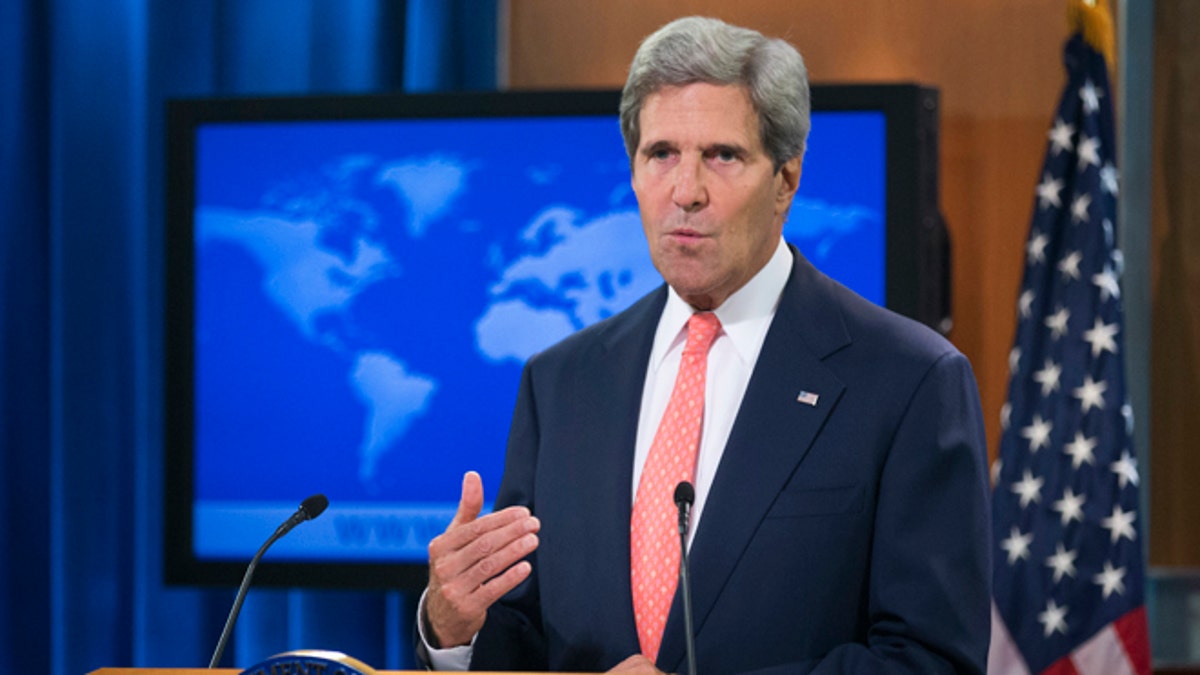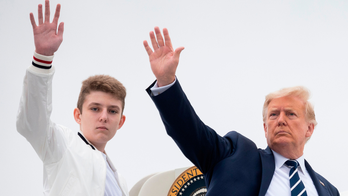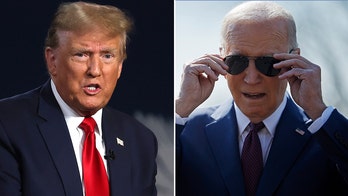
Aug. 26, 2013: Secretary of State John Kerry speaks at the State Department in Washington about Syria. (AP)
The Obama administration was inching closer to a decision on how and whether to strike Syria, after Secretary of State John Kerry and the White House both declared that the evidence showing chemical weapons were used in a deadly attack last week is "undeniable."
"What is before us today is real, and it is compelling," Kerry said.
Administration officials, signaling they might not wait until U.N. inspectors finalize their own investigation, now say that the international community must respond to the use of chemical weapons. The comments from top U.S. officials on Monday signaled a shift in tone, with military action looking more likely than it did just a day or two ago.
Two administration officials said the U.S. was expected to make public a more formal determination of chemical weapons use on Tuesday, with an announcement of Obama's response likely to follow quickly.
The secretary of state addressed the allegations from State Department headquarters on Monday. He pointed a finger squarely at the Assad regime, sharply questioning any suggestion that the weapons could have been deployed by the opposition, or that the attack could have been staged. He called the strike a "moral obscenity" and accused the Syrian government of trying to destroy the evidence.
In Damascus Tuesday, the state-run Syrian Arab News Agency issued a statement Tuesday accusing Kerry of citing "fabricated" evidence and saying that the secretary of state insisted on "jumping over" the work of U.N. inspectors, showing that the U.S. intended to exploit events.
Also, Syrian Foreign Minister Walid al-Muallim said that the Assad government was not obstructing the work of the inspectors, but later announced that a second day of inspections would be pushed back to Wednesday instead of Tuesday. Al-Muallim cited disputes between groups of rebels as the reason for the postponement.
Al-Muallim also vowed that the Syrian Army would carry out its campaign against the rebels despite the possibility of foreign strikes, which he said would only serve interests linked with Al Qaeda.
Earlier, U.N. spokesman Farhan Haq told the Associated Press the inspection team planned to go out again Tuesday to do more sampling, and activists said the team was expected in the eastern suburbs of Zamalka and Ein Tarma. On Monday, the investigators visited the site of the alleged chemical weapons attack -- they were earlier fired upon by unidentified snipers. The attackers struck one of the vehicles; the Assad regime accuses rebels of being behind the attack, while the rebels say government allies were responsible.
Kerry's comments drew the United States one step closer to possible military action. Kerry reiterated that President Obama is weighing the situation and will make an "informed decision" on how to respond in the coming days. But the secretary said the world must stand up to make sure such an attack never happens again.
The images from last week's attack, he said, "should shock the conscience of the world."
White House Press Secretary Jay Carney said Monday that there was "very little doubt that the Assad regime used those weapons." Carney added that the attack was a "clear violation of international norm," but also said that Obama has not made a decision on possible military action.
"There is not a military solution to this conflict," Carney said. "Ultimately, Assad has to step aside."
On Tuesday, British Prime Minister David Cameron said the alleged chemical attacks were "absolutely abhorrent" and added that Britain was considering a "proportionate response." Cameron announced Tuesday that he would recall Parliament earlier than scheduled to discuss a response to the events in Syria. A spokesman for the Prime Minister told reporters it was "reasonable to assume" that British forces were making contingency plans in the event of military action, but stressed that no such decision had been taken yet.
Also Tuesday, Turkish Foreign Minister Ahmet Davutoglu told reporters that the actions of the Assad regime were "a crime against humanity and ... should not go answered. Today, it is clear the international community is faced with a test."
Italy is insisting that any military strike against Syria for its alleged chemical attack on civilians must be authorized by the U.N. Security Council.
Briefing Parliament on Tuesday, Foreign Minister Emma Bonino called the chemical attack a "war crime," but said the government wouldn't support military action without Security Council authorization.
"Italy will not take active part in any military action ... beyond the context of the Security Council," Bonino said, "which for us is and remains the only point of legal reference that cannot be ignored."
The State Department said late Monday it is canceling a meeting between Undersecretary Wendy Sherman and U.S. Ambassador to Syria Robert Ford with their Russian counterparts because of ongoing consultations about U.S. response to the alleged chemical weapons attack in Syria.
A senior State Department spokesman told Fox News the meeting will be rescheduled.
Leading members of Congress are starting to press the administration to consult with them first before any possible response.
"Using chemical weapons against innocent civilians is unacceptable. No regime can be allowed to do so with impunity," said. Rep. Buck McKeon, R-Calif., chairman of the House Armed Services Committee. "I expect the commander in chief would consult with Congress in the days ahead as he considers the options available to him. Drawing red lines before you know what you are willing to do to back them up is folly, but now that American credibility is on the line, the president cannot fail to act decisively."
Kerry's comments indicate the U.S. is not waiting for a U.N. finding to proceed. He noted the team will likely not issue a finding on who was responsible for the strike.
At this stage, the U.S. is looking for international support from its allies before pursuing any particular course of action. Obama spoke over the weekend with the leaders of France and Great Britain. Britain's Prime Minister David Cameron, though, is facing pressure to win approval from Parliament before proceeding with any military plan.
While the U.S. and its allies deliberate, the Navy has sent four warships into the eastern Mediterranean Sea. According to senior U.S. defense officials, the four Destroyers are in position and would be capable of launching a missile strike at a moment's notice.
Onboard each ship are up to roughly 90 Tomahawk missiles. U.S. military officials said the Pentagon is in a "watch-and-wait mode," and the decision rests with Obama. One official suggested it is unlikely the U.S. will launch any strike while U.N. inspectors remain on the ground, for fear they could be taken hostage.
The Associated Press contributed to this report.




